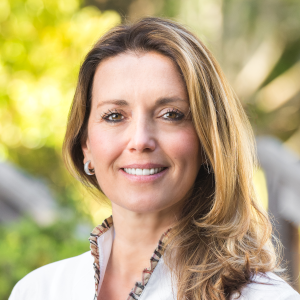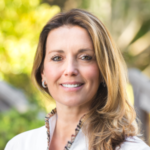
14 Sep Q&A with Erika Monteverdi, Cancer Commons

Erika joined Cancer Commons in 2016 as one of Silicon Valley’s only nonprofits focused on serving cancer patients globally through aligning incentives around the patient to produce better outcomes. In Erika’s role as Executive Director, she is responsible for overseeing the growth of Cancer Commons and operations. Today, Cancer Commons is one of the leading cancer knowledge networks. Read her full bio.
Interview with Erika Monteverdi, Cancer Commons
Q: What is it to be overwhelmed by the need to act?
A: It only takes one experience of a loved one’s diagnosis of advanced cancer to be jarred, because quite frankly, navigating a cancer diagnosis is a nightmare. When patients and their families receive a cancer diagnosis, they are shocked, confused, paralyzed. Your doctor may advise you of tests to take, and possibly a way forward. Maybe you Google the specific cancer in search of information because you desperately want to eliminate confusion and gain clarity. Yet you quickly discover that you don’t know which of the thousands of search results have trusted in-formation or how to put the information together in a way that you can understand it.
At the same time, you feel a sense of urgency to decide who is the best doctor, and where you can receive the best care. You then start looking for second and third opinions, all of which come back with slightly different information and the entire cycle of confusion starts all over again. Many patients feel adrift at a time when they most need confidence.
That’s why I got into the work of Cancer Commons, to help patients with advanced cancer feel moored and give them direction in this trying time.
Q: What problem are you currently trying to solve?
A: We are trying to help advanced cancer patients get practical “shots on goal” against their can-cer AND learn from the massive number of therapies tried with patients.
The volume of information is a huge hurdle. There are now hundreds of approved targeted drugs and immunotherapies, and hundreds more in pharma’s pipeline. With thousands of mo-lecular subtypes of cancer and tens of thousands of oncology papers published each year, it is impossible for anyone to stay abreast of all the latest knowledge.
Communication about the therapies that are tested is yet another hurdle. Often no one knows the optimal way to use available drugs because the best treatments involve intelligent combi-nations, and there are far more plausible regimens than can be tested in clinical trials. Patients who have exhausted the standard of care are routinely treated with off-label drugs and rational cocktails. Unfortunately, these individualized (“N-of-1”) experiments are uncoordinated, and their results seldom reported, so little is learned.
Q: When people are diagnosed with advanced cancer, how do they get what they need?
A: Cancer patients need a team of experts to help find and access the best possible treatment op-tions for their specific cancer, combining available knowledge and clinical experience to identi-fy the right treatment at the right time for each patient. Cancer Commons fundamentally sup-ports patients with a personal guide and services to help navigate every step of the cancer journey.
When patients register with Cancer Commons, they join a dynamic community of physicians, experts, researchers, and other patients collectively exploring the available options far more efficiently than they could as individuals. Every patient and every physician contributes infor-mation about how treatments are working (and not working) and what new options they are considering, while keeping each patient’s health information private.
Cancer Commons solicits treatment and trial recommendations from its own virtual tumor boards and additional academic molecular tumor boards curate cases contributed to the Cancer Commons Knowledge Network. This pooled knowledge is rapidly disseminated to all patients and physicians who might benefit, and we continuously refine the information based on clinical results. When the optimal treatment is unknown, the Knowledge Network can dynamically ag-gregate similar patients in a virtual trial and coordinate the patient’s ideal individual experi-mental treatments. By learning from every patient, Cancer Commons seeks to transform the everyday practice of oncology into a global adaptive community collaborating in the search for better treatments and cures.
Additionally, we need to aggregate the treatment recommendations and rationales from top oncologists at elite cancer centers, and rapidly disseminate these to the benefit of all patients. Finding the best treatments and getting everyone up to that level can save many hundreds of thousands of lives a year – starting immediately, since no new drugs or knowledge is required.
Q: With the growth of precision medicine, how do you see it work for cancer patients?
A: Precision medicine holds incredible promise for cancer patients but realizing that potential has proved challenging. Over the past decade, the FDA has approved dozens of novel targeted- and immuno-therapies, which are generally safer and more effective than traditional chemothera-py. They are also much more expensive and only work in selected patients, but the selection criteria are not well-understood. Moreover, no one knows the optimal way to use these thera-pies because the best treatments involve intelligent combinations, and there are far too many plausible regimens to test in traditional clinical trials.
These challenges demand we rethink clinical research and care to continuously learn from all patients, all physicians, all therapies, all the time. No single organization can do this on its own, which is why we need an Industry Alliance of oncology stakeholders to focus on practical solutions that address roadblocks and unmet needs.
Q: Who experiences change/s in their lives as a result of what you do/have done?
A: We are rewriting a story for patients and their caregivers that was once set in stone. Our goal is to get patients to the next promising treatment by combining available knowledge and clini-cal experience to produce the “best shots on goal” for patients. We learn from every patient and the research on their behalf has informed the treatment of countless others in 44 countries to date. Curing advanced cancer patients is challenging, but we believe that a longer life ex-pectancy and good quality of life is attainable. We are empowering patients to take charge of their care. In the words of one patient, “You are elevating the patient to equal status to the other stakeholders (in the health care system).”






